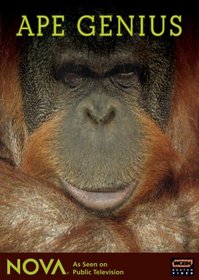| Actor: Nova Director: Nova Genres: Special Interests, Educational, Documentary Sub-Genres: Nature & Wildlife, Educational, Science & Technology Studio: WGBH Boston Format: DVD - Color DVD Release Date: 05/20/2008 Original Release Date: 01/01/2008 Theatrical Release Date: 01/01/2008 Release Year: 2008 Run Time: 0hr 56min Screens: Color Number of Discs: 1 SwapaDVD Credits: 1 Total Copies: 0 Members Wishing: 1 MPAA Rating: NR (Not Rated) Languages: English |
Search - Ape Genius on DVD
  | Ape Genius Actor: Nova Director: Nova Genres: Special Interests, Educational, Documentary NR 2008 0hr 56min It s easy to feel empathy for the great apes chimps, bonobos, orangutans, and gorillas which are our nearest relatives in the animal world. They have some of the largest brains in proportion to body size of any animals. Fo... more » |
Larger Image |
Movie DetailsSimilar Movies
|
Movie ReviewsWhat exactly is it that differentiates their thought process Midwest Book Review | Oregon, WI USA | 08/14/2008 (5 out of 5 stars) "Ape Genius is an episode of the scientific public television series NOVA on DVD that seeks to answer the questions: just how smart are the great apes (chimpanzees, bonobos, orangutans, and gorillas), and what exactly is it that differentiates their thought processes from those of humans? Apes have been seen to use tools, and controlled experiments have shown them to possess shared culture, even the ability to perform simple math. Yet the latest research has revealed subtle, crucial limitations ape brains have that prevent them from dominating the world like humans have. An utterly absorbing and educational presentation, enthusiastically recommended for public library collections and anyone curious about what makes humans unique among the animal kingdom. 54 minutes, color, with the options of closed-captioned and described video for the hearing impaired." This film makes you think a lot about human intelligence! D. E. Hill | Centennial, CO United States | 12/18/2008 (5 out of 5 stars) "For me, the highlight of this production is the comparison of other ape with human ape problem-solving. There is a strong suggestion that human apes are more likely to follow instructions, rather than the truth that they can clearly observe. This reminds me of the fact that many of Aristotle's false "observations' (such as, objects of different weights fall at different speeds) constituted authoritative knowledge for more than a thousand years, even though they could have been easily disproved by anyone who wanted to test them (Galileo in this case, although few believed him at the time). I think that it also says much about the human ape propensity for religion, or official knowledge. For humans, agreement in a social context may have more survival and reproductive value than real facts or personal observations. Anyway, well-done and worth watching." Where do they end and we keep going? Jeffery Mingo | Homewood, IL USA | 06/24/2008 (4 out of 5 stars) "I love the multiple purposes of the title. It could be oxymoronic or it could refer to humans. I'm thinking about the surprised meaning behind the title of Nicole Kidman's "The Others" in thinking about it.
There are so many thoughtful points mentioned here. Apes can figure out the sequence between one through seven, but they don't have that "a-ha!" moment where they realize that one plus x equals the next highest number. Apes do not understand the purpose behind pointing, but dogs can figure it out. An ape can cooperate with a human to move a stone, but two apes wouldn't similarly work together. Some viewers may be frustrated in how this work presents other primates as smart yet stupid. Still, I think the work is trying to measure what apes can learn and what they cannot, so that we can point to traits that are currently solely human. Sometimes the work sounds in awe at what apes can do, but I always had heard that primates are smart. It is not that surprising. Also, I think some of this work just proves what humans are now able to videotape, rather than observe and have no one believe them. The work shows an old video of Jane Goodall and she did not look like Sigourney Weaver, by the way. This work is actually diverse. It shows humans in the US, Japan, Germany, and Africa interacting with primates. It interviews men and women. It often compares primates and little kids and viewers with an interest in child psychology may love seeing that. Wearing an environmentalist cap, I was worried about something. I feared the work would say, "Aren't other primates stupid?!" and have the tacit suggestion, "See! That's why we can destroy their habitats and not care less if they go extinct!" This work didn't seem to say that the difference between humans and other beings is a reason for mistreating or killing off these important animals." |



